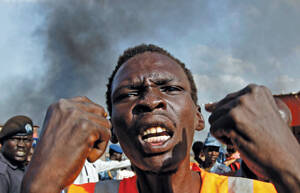Church leaders in South Sudan fear that a new war will break out in the region soon unless the United Nations and African Union intervene. Tension between Sudan and South Sudan spiked after the temporary occupation of the oil-field town of Heglig by military from South Sudan. Other disputed territory includes Abyei, an area rich in oil on the border of the two states. On April 21 a Catholic church in Khartoum’s Al-Jiraif district was destroyed by a Muslim mob, and a Sudanese air force attack on the South Sudan city of Bentiu on April 23 killed three people, including a child, and wounded at least 10 others.
South Sudanese troops overran the Sudanese army in Heglig on April 9, claiming the area under a 1956 agreement that the South believes set the border north of the town. Heglig had been used as a staging ground for military assaults by Sudan on South Sudan, particularly on the nearby city of Abyei, since May 2011. South Sudanese forces agreed to withdraw on April 20, but forces on both sides of the border appear to be preparing for more conflict. South Sudan seceded from Sudan after a referendum in January 2011 and officially became an independent nation on July 9.
Auxiliary Bishop Daniel Adwok Kur of Khartoum, Sudan, said that tensions between Sudan and South Sudan, the world’s newest nation, could be defused if the United Nations and the African Union determined the proper border between the two countries. Bishop Adwok, who is from the south, said civilians in the disputed area around Heglig, a small town in southern Kordofan State on the edge of rich oil fields, are being victimized by attacks from both sides.
Dan Griffin, Sudan adviser for the U.S. bishops’ Catholic Relief Services, said on April 17 that disaster is “looming” and that the current border conflict could give rise to a new war. “We’ve got to get the message out to prevent Africa’s longest-running war from returning,” he said a day before he was to travel to South Sudan to assess the situation and to check on C.R.S. programs in the region.
He called for negotiations mediated by the United Nations and the African Union to end the conflict and to review the 1956 documents establishing borders among various tribes in the region. Griffin said repeated shelling and aerial bombardments on Abyei by Sudanese forces must also be investigated.
A church source in the south said there appears to be strong popular support for the decision to confront Khartoum in Heglig, although “one must keep in mind that South Sudan [is] an authoritarian regime, so if someone were to openly oppose the government policy, they would have some risks.” The source added, “The regime of Khartoum is no less oppressive and has mobilized the population in view of an open conflict with the South.” With governments in Khartoum and Juba, capitals of the the north and south respectively, tilting toward conflict, “only a decisive intervention of the international community can stop the war.”
On Easter, Archbishop Paolino Loro Lukudo of Juba, South Sudan, called for an end to the fighting, saying violence does not meld with God’s intention of peace for all people as promised by Christ’s resurrection. He also said clashes among rival groups in neighboring Jonglei State must cease.








